How do I make an input text using CSS, with a dashed bottom border/line that the length of strokes are equal to the length of each character?
Here's an example:

How do I make an input text using CSS, with a dashed bottom border/line that the length of strokes are equal to the length of each character?
Here's an example:

dashed border style doesn't give the exact effect because we cannot control the length of strokes. Instead, we can make the dashed border by using an absolutely positioned pseudo-element behind the input, and specify the space between strokes by letter-spacing property.
input[type="text"] {
-webkit-appearance: none;
-moz-appearance: none;
appearance: none;
border: 0;
outline: 0;
background: transparent;
width: 12.70em;
font-size: 1em;
}
.input-wrapper, input[type="text"] {
font-family: monospace;
font-weight: bold;
letter-spacing: .3em;
}
.input-wrapper {
display: inline-block;
position: relative;
overflow: hidden;
padding-bottom: .2em;
font-size: 200%;
}
.input-wrapper:after {
content: "——————————————————————————————";
line-height: .3em;
position: absolute;
bottom: 0;
left: 0;
z-index: -1;
}<div class="input-wrapper">
<input type="text" value="Hello World" maxlength="15">
</div>You could also use a single span per each letter and achieve the same result (using just border-bottom and setting fixed width, height and margin):
span{
display:inline-block;
border-bottom:5px solid black;
margin-right:2px;
width:20px;
text-align:center;
height:30px;
font-family:Verdana;
font-weight:bold;
font-size:24px;
/* Add padding-bottom if changing the font-size */
}<span>H</span>
<span>E</span>
<span>L</span>
<span>L</span>
<span>O</span>
<span> </span>
<span> </span>
<span> </span>
<span> </span> I had the same problem recently and found another way around the issue:
Hashem Qolami provided a link, and I found this answer by Balthazar pointing at the dashed border generator tool by kovart. The tool is awesome and makes our lives a lot easier!
I decided I only need to modify it a little and use line instead of rect in the resulting SVG code.
After that, selecting the correct parameters of the SVG vs font-size vs letter-spacing did the trick.
I only had to worry about digits, so I didn't have to use monospace font to make it work, but it's not the case for text inputs.
Please have a look at the snippet (enter Full Page to make it look as it was intended to):
input {
width: 100%;
padding-left: 19px;
border: 0;
outline: none;
font-size: 26px;
letter-spacing: 27px;
}
/*
Background image from here (slightly adjusted – `line` instead of `rect`):
https://kovart.github.io/dashed-border-generator/
x2: cut the beginning of the dashes
stroke-dasharray: change the width of the dashes and the blanks
stroke-dashoffset: change the starting point of the dashes
stroke-width: change the thickness of the dashes
*/
input[type="text"] {
font-family: monospace; /* That's the trick here */
background-image: url("data:image/svg+xml,%3csvg width='100%' height='100%' xmlns='http://www.w3.org/2000/svg'%3e%3cline x1='100%' y1='100%' x2='4' y2='100%' fill='none' stroke='black' stroke-width='4' stroke-dasharray='33%2c10' stroke-dashoffset='11' stroke-linecap='square'/%3e%3c/svg%3e");
}
input[type="number"] {
width: 274px;
letter-spacing: 28.5px;
background-image: url("data:image/svg+xml,%3csvg width='100%25' height='100%25' xmlns='http://www.w3.org/2000/svg'%3e%3cline x1='263' y1='100%' x2='11' y2='100%' fill='none' stroke='black' stroke-width='4' stroke-dasharray='33%2c10' stroke-dashoffset='39' stroke-linecap='square'/%3e%3c/svg%3e");
}
/*
Just hiding the browser up/down arrows
The keyboard arrows still work, of course
*/
input[type="number"]::-webkit-outer-spin-button,
input[type="number"]::-webkit-inner-spin-button {
-webkit-appearance: none;
}<input type="text" value="Hello">
<br/>
<br/>
<br/>
<br/>
<!-- Here's a 6-digit input example -->
<input type="number" temp="" pattern="\\d{6}" max="999999" oninput="validity.valid ? this.temp = value : value = this.temp" value="123456">